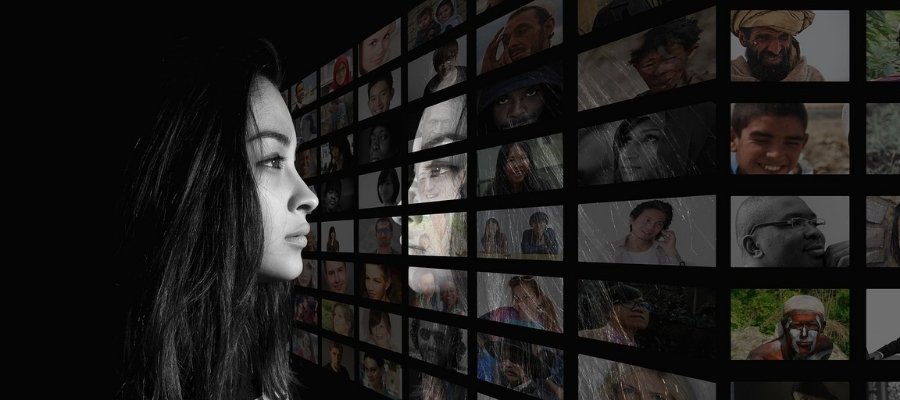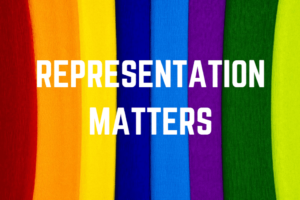I realized last night that I have never had a teacher who looked like me. With 19.5 years of education, there was not one single teacher with eyes and dark hair like mine. Did this impact my academic performance? I don’t know. Did it contribute to my narrative? Absolutely. Let’s talk about diversity in speech-language pathology.
There is a term in the world of psychology, mirroring. It means that there are those of us who had the privilege of seeing ourselves in our role models in books, movies, TV shows and everyday activities. Then, there are those of us who do not have this benefit. In other words, when a student or a client resembles the person teaching him, there are benefits (Lindsay, 2017; Wright, Gottfried, & Le, 2017). I acknowledge that I fall into the latter camp. For example, as a kid, I was a voracious reader—Little House on the Prairie, A Wrinkle in Time, Ramona. It was not until I met Claudia Kishi in The Babysitter’s Club that I finally got a glimpse of myself. She was an Asian-American teenager. Then, I saw The Joy Luck Club. Like, whoa! Imagine a movie that aligned with my own experiences as a person living in a bi-cultural world as an Asian-American.
English Language Proficiency for SLPs
So, what does this have to do with the field of speech-language pathology? First, let’s talk about our Language Diversity. Recently, ASHA released certification standards to change in 2020. I am excited to see the addition of literacy-based knowledge and skills and a focus on the people skills of our job–interprofessional education and interprofessional practice. At the end of the document, a statement read “The CFCC (Council for Clinical Certification in Audiology and Speech-Language Pathology) is considering a requirement for English language proficiency. If approved, this requirement will be included when the standards are announced.” This is a complex topic that brings up many considerations for the field. One question we need to ask is, “How will this impact the diversity of speech-language pathology?”
So, this got me thinking about the importance and value of diversifying our field to support our clients and students. “Of the 185,563 individuals represented by ASHA, 11,958 (6%) indicated they met the ASHA definition of bilingual service provider. Of these, 10,930 were ASHA‐certified SLPs and 749 were ASHA certified audiologists.” (Demographic Profile of ASHA Members Providing Bilingual Services, February 2018). Six percent of SLPs consider themselves bilingual! Of course, we understand that understanding difference from disorder is clutch for every single SLP, and we can also continue to put in the effort to change the face of our field to better represent those we serve.
Diversity Needs
Now, I acknowledge that the previous two paragraphs speaks to the language diversity of our field. This is important. Equally important is racial, ethnic, sex and gender diversity of our field. This post was initially written with this in mind and heart. At this time, Multicultural constituency groups (MCCGs) are allied/related professional organizations that are independent of the American Speech-Language-Hearing Association. Each MCCG focuses on an identified population and addresses the client/patient/professional/student perspective of that population (ASHA). MCCG groups include the L’GASP–GLBTQ Caucus, Native American Caucus, National Black Association for Speech-Language and Hearing (NBASLH), Hispanic Caucus, Asian Indian Caucus and Asian Pacific Islander Caucus.
3 Ways to Diversify the Field of Speech-Language Pathology
Here are easy ways to diversify the field:
- Support and mentor our SLPs who speak a native language other than English. Rather than try to weed out SLPs who are still in the process of acquiring English, let’s find ways to support them and help them grow. What can this look like? First, understand that the cultural narrative that the SLP brings to the table valuable and relevant. On several occasions, I have had parents effusively thank me for speaking their native language, “Cô Phượng, cảm ơn nhiều . Chị hiểu mình ./Ms. Phuong, thank you so much. You understand us.” This is a SuperPOWER that can yield important and meaningful outcomes for our students, clients and families.
- Support and mentor our SLPs who represent narratives of identified populations and addresses the client/patient/professional/student perspective of that population. Again, by supporting our SLPs and SLPs-to-be representing valuable populations, we are building cultural competency for the field. This will improve the quality of speech, language, and hearing services for individuals and families we support.
- Use materials that represent our caseloads. Within our Bilinguistics’ walls, we highly regard literacy-based interventions. Using and scaffolding age-appropriate books that also speak to our clients’/students’ narratives is an impactful way to show our children and families that their experiences matter. These efforts are valuable.
- Continue to talk about diversification in the field. Let’s be honest. This topic is not typically discussed in the field of speech-language pathology, and it may feel uncomfortable. In saying that, it’s important to dialogue about the merits of bringing in faces and experiences that align with our caseloads. Advocating for representation does not discount the efforts of our current service providers. Remember, we can continue to support our monolingual SLPs, and advocate for positive transformations in our field. The two considerations are not exclusive.
So, to our SLPs, I want to say, “Thank you.” Thank you for choosing our wonderful profession. Thank you for supporting our students, clients and families. Thank you for sharing your important gifts. Thank you for growing our field in valuable ways. Let us continue our work to support our diverse populations and diversification of our field. We are masters of supporting individualized strengths of our clients and students. This skill-set can surely impact our SLP-peers from all walks of life, as well.




I would title this Language Diversity since it mainly talks about bilingualism and not ethnic or racial diversity. As an African American SLP, I did not have a teacher who looked like me until receiving my 2nd Masters Degree! I attended the Northeastern Conference for Speech Pathologists 3 years in a row and was always the only Black person in the room.
As a monolingual SLP who works in a school where Spanish and Haitian Creole are the win home Language summer of our students, y biggest challenge to bilingualism has been finances. I use free resources/apps of courses but classes are expensive and we all know that full immersion is key so travel funds are neeed.
Leeta,
Thank you for taking the time to add your experiences to this post. I wanted to make an argument for more racial and ethnic diversity in the field, and I can surely add more to make that point clearer in the post. Upon your feedback, I went back in to the post. You are right. I initially spoke about racial and ethnic diversity and then proceeded to make strong arguments for Language Diversity. As I navigate this complex and important topic, I am appreciative of your brain and feedback. I am hopeful this post will lend itself to continued dialogue.
Thank you and take care,
Phuong
Thank you Phuong. well said. When my Dark Skinned Asian daughter at 8 years old told me she wanted to be a teacher when she grew up, I told her that was awesome. Then she looked at me sadly and asked if brown skin people could be teachers because she had never seen one ?
Joann,
Your daughter is lucky to have you cheering on her dreams. Your sentiments are changing the narrative of our future–for the better. Thank you, Joann.
Take care friend,
Phuong
I think your theme is important, however I think your reference to mirroring is confusing.
You may need to add another sentence explaining what mirroring is, and that it has less chance of occurring if listener does not resemble the speaker.
Hi Robin,
Thank you for the feedback. You are right. I went in and added content to support the understanding of the term. This is important, and I appreciate your help in supporting my goal of addressing this meaningful and important topic. You are appreciated, Robin.
Phuong
This is a cool article. I’m late and my experience was different. I always saw professionals who looked like me because I lived in a diverse city, and my parents were purposeful about locating people in all fields who I could relate to (at least phenotypically), because none of us belong to a MONOLITHIC group. I’m an AfroLATINA (Black race-Latina cultured from a Latin heritage) SLP. So there’s a subculture within my entire existence that has yet to even be represented at ASHA.
Great dialogue. One of my first teachers was and one of my first best friends (who is still a great friend and was my bridesmaid) were Asian-American. So yes, representation is important.
TJ,
What a gift to have so many perspectives layered onto your personal narrative as you grew up. And, yes, you are absolutely right. Not a single person belongs to a monolithic group. Alas, we find our powerful, for us and those we serve, when we move beyond indivisible and uniform practices and ideologies. I wholeheartedly believe that telling our stories changes the fabric of our profession. Thank YOU for adding your experiences to the conversation.
Take care,
Phuong